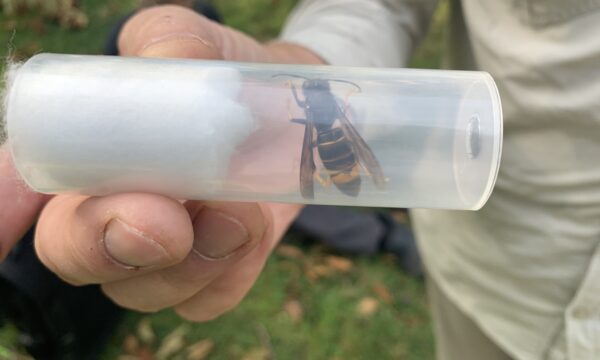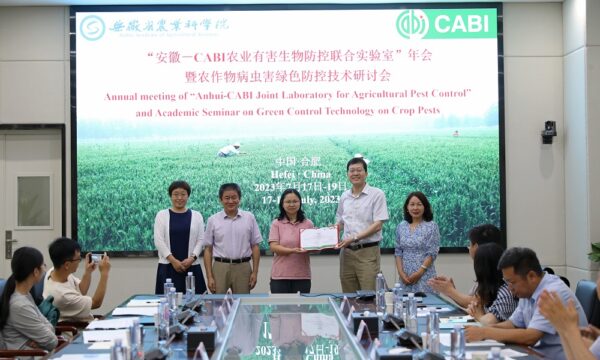
CABI’s experts in the biological control of agricultural pests and diseases have conducted the first major study of potential biological controls that could be used in the fight against the devastating fall armyworm which recently arrived in Africa.
The fall armyworm (Spodoptera frugiperda) attacks around 100 species of plant including rice, sorghum and sugarcane but favours maize. It has already started to cause substantial damage to staple crops grown by smallholder farmers in many parts of Africa.
According to a CABI evidence note, commissioned by the UK Department for International Development (DFID), crop losses from just 12 countries could be between $1 to $4.6 billion.
Many farmers in Africa are turning to pesticides to tackle the fall armyworm – as highlighted in the new paper ‘Assessement of potential biopesticide options for managing fall armyworm (Spodoptera frugiperda) in Africa’ published in Journal of Applied Entomology.
However, Dr Melanie Bateman, lead author of the research, says that while the ‘fall armyworm is an important and challenging pest management target in Africa’ safe, sustainable and effective interventions such as biopesticides are a ‘key component of management strategies’ to consider over chemical controls.
The assessment looked at 50 biopesticide active ingredients (AI) which have been registered in one or more of the 30 study countries for fall armyworm management. This includes 11 study countries in fall armyworm’s native range where farmers have been managing this pest for centuries and 19 in Africa where it is a new pest for farmers. Of these AI, 23 are recommended for further consideration and eight have been identified for short term action. These include:
- Neem and Bt products as well as several other AI that are registered within sub-Saharan Africa
- Sex pheromones and macrobials such as Trichogramma spp.– also highlighted as priority biopesticides to investigate further, although in some countries they do not need to be registered
- Spodoptera frugiperda nucleopolyhedrovirus (NPV) which so far is only registered outside sub-Saharan Africa
The study, funded by Deutsche Gesellschaft für Internationale Zusammenarbeit (GIZ), presents a number of recommended immediate short term and medium-term activities to move further research forward. For the short-term these include the possible fast-tracking of assessments for the registration of biopesticides (where they are not already) as well as reviewing and updating of extension materials to reflect the availability of suitable biopesticides. For the medium-term, the researchers suggest that governments could assist farmers by subsidising biopesticides (an approach Ghana is already adopting) or, where proven biopestide AIs are not locally available, consider opportunities for the local production of products – working in partnership with private sector companies.
Dr Melanie Bateman, Integrated Crop Management Advisor at CABI, said, “Some governments in Africa have given out insecticides to farmers, including some highly hazardous products.
“However, the Food and Agriculture Organisation of the United Nations has developed a Framework for Partnership which emphasises alternatives to pesticides – such as microbials and their extracts, botanicals, semiochemicals, inorganic biochemicals, predators and parasitoids.”
Dr Bateman states that many different national, regional and international research organisations, as well as biopesticide manufacturers themselves, have made the identification of low-risk management options for fall armyworm a high priority but that cost is an important factor.
Dr Bateman added, “While some farmers might be willing to pay a premium for a lower risk product, many smallholder maize farmers in Africa already have small margins so will seek to minimize the additional cost of controlling a new pest such as the fall armyworm.
“If a significant market for a lower risk product can be developed, the price may fall. With that in mind, currently unaffordable products should not be automatically ruled out for further consideration.”
CABI Synopsis:
Full paper reference:
Bateman, ML, Day, RK, Luke, B, Edgington, S, Kuhlmann, U, Cock, MJW, ‘Assessment of potential biopesticide options for managing fall armyworm (Spodoptera frugiperda) in Africa,’ J Appl Entomol. 2018;00:1–15.
8 Comments
Leave a Reply
Related News & Blogs
Training on mass production of entomopathogenic nematodes for biological control of invasive insect pests
A team of global experts in the production of biocontrol agent provided a practical training on the mass culture of entomopathogenic nematodes at the Biocontrol Agent Facility of Rwanda Agriculture and Animal Resource Development Board (RAB), writes Dr…
20 December 2023





Fall armyworms popularly known as maize plant dependants. Fall armyworm can be one of the more difficult insect pests to control in field maize corn. Late planted fields and later maturing hybrids are more likely to become infested. Fall armyworm causes serious leaf feeding damage as well as direct injury to the maize corn leaves. While fall armyworms can damage corn plants in nearly all stages of development, it will concentrate on later plantings that have not yet silked. Like European corn borer, fall armyworm can only be effectively controlled while the larvae are small. Early detection and proper timing of an insecticide application are critical and will result to better worm control.
A very educative document. Keep it up
Reblogged this on The Plantwise Blog.
[…] CABI study identifies safer options for fall armyworm control in AfricaIn “Agriculture” […]
[…] 14. CABI study identifies safer options for fall armyworm control in Africa (October) […]
[…] CABI study identifies safer options for fall armyworm control in Africa […]
[…] 14. CABI study identifies safer options for fall armyworm control in Africa (October) […]
[…] CABI study identifies safer options for fall armyworm control in Africa […]